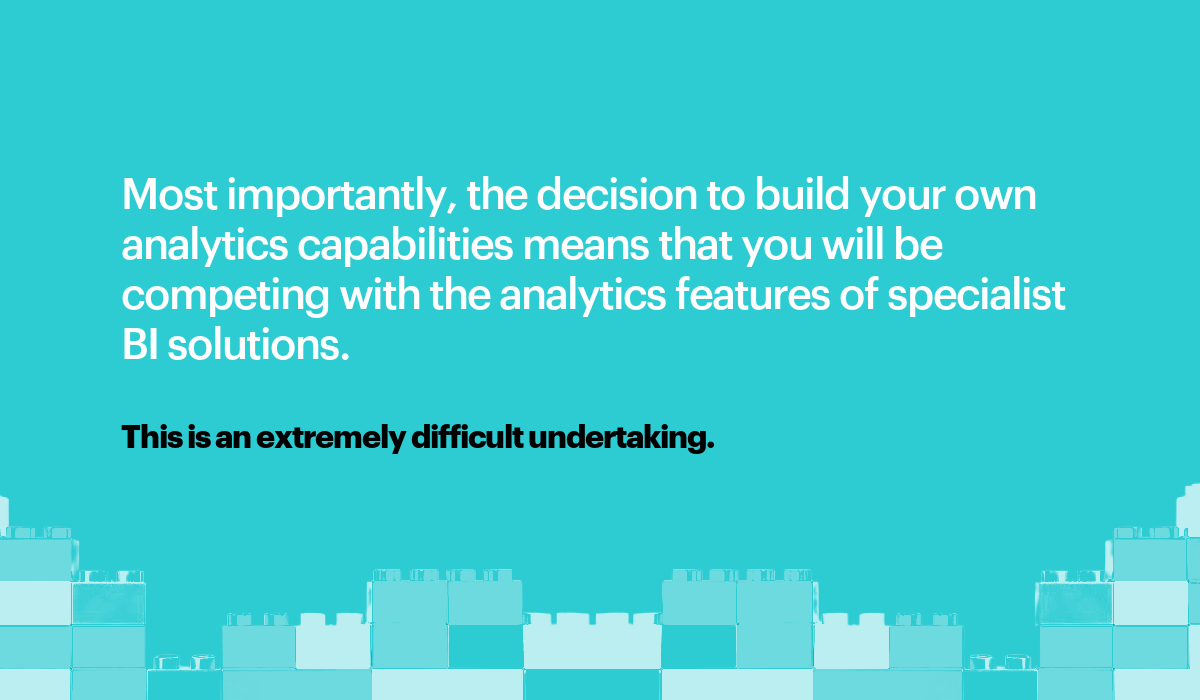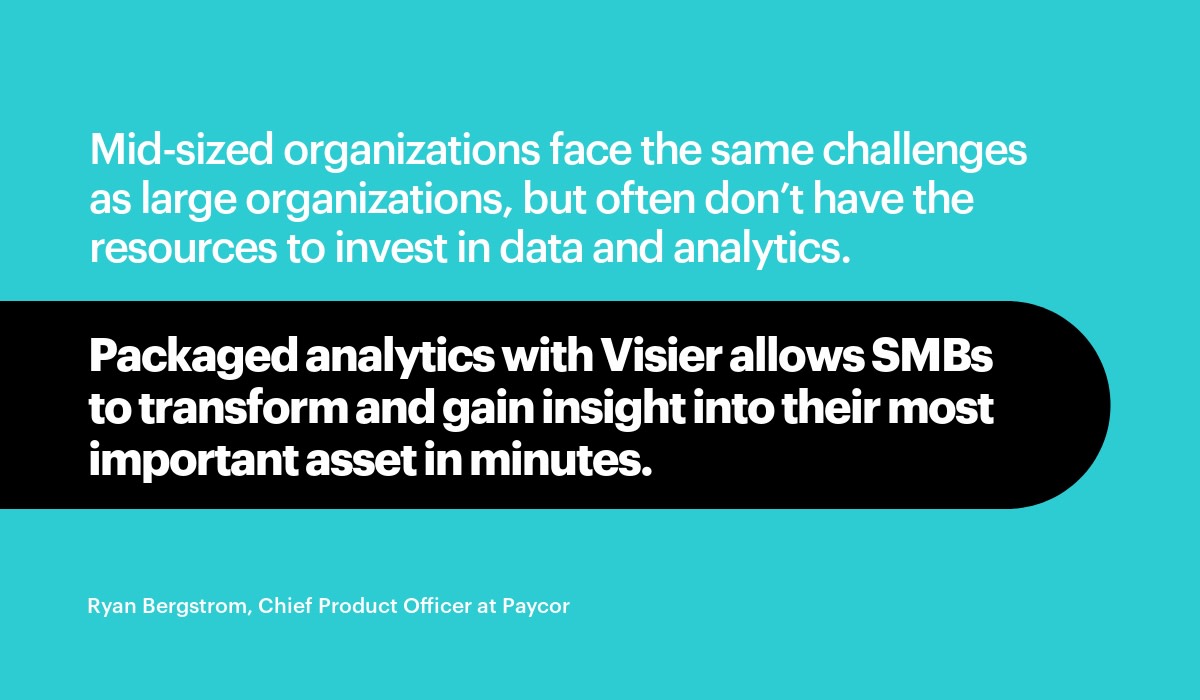Embedding Analytics: Build, Buy, or Partner?
Discover the questions you should ask if your organization is looking to bring analytics capabilities into your product.

Companies looking to bring analytics capabilities into their product typically review two options: to build or to buy.
Overwhelmingly, the vast majority of product teams lean towards building analytics capabilities in-house with their own developers—despite the need for quick integration and time-to-market pressures.
It’s an understandable first thought. Many product leaders have a specific vision for their solution that they don’t believe a third-party application will be able to deliver on.
However, this “build-it-myself” mentality inevitably leads to long-term challenges—including some which aren’t initially obvious.
“I could build that”
Many have tried. Few have succeeded. Building an analytics solution from the ground up is a complex undertaking.
It can take years to build and refine an analytics solution that works. Aside from the advanced data expertise and technical integration required, building your own solution in-house means you now have to consider all of the following factors:
Recruiting the necessary skills for implementation—and footing the cost of that investment
Dedicating all the necessary resources for your homegrown analytics functionality (including support, maintenance and upgrades)
Ensuring UX consistency with your core application
Most importantly, the decision to build your own analytics capabilities means that you will be competing with the analytics features of specialist BI solutions. This is an extremely difficult undertaking.

Your customers already want analytics for their day-to-day work. Companies with the in-house skills and bandwidth may even be pulling data from your core application into their own BI tools to run analyses. Either way, they need insights that go beyond basic dashboards. If your business does not have the expertise, the bandwidth, or the knowledge needed to create an advanced homegrown analytics solution, then it’s not advised to pursue this path.
Plus, with the time and resources required to build your own analytics offering, you could face higher costs, increased risk, and delayed time-to-market. And all that means less time spent innovating on your core business offering.
“There’s a general-purpose BI tool for that”
Buying an established business intelligence (BI) solution can do away with many of the problems of building your own analytics. But a general-purpose BI tool may not be the kind of solution you’re looking for. According to Gartner, anywhere from 70 to 80 percent of business intelligence initiatives end up failing.
While reports from BI tools provide important information, they are usually flat, with no drill-down capabilities. This takes away from the deeper analyses into underlying trends, risks, and predictive models. Besides that, are you sure of the kinds of questions your customers want to ask of their data? Is your organization prepared to build, load, and do all of the data work to prepare the BI tool for your customers?
Here are some guiding questions that can help as your company starts looking for an embedded analytics solution:
1. How much time and resource investment will be required?
Liaising between developers, IT, customer success, sales, and marketing to deliver a product that delights your customers is no easy task.
That’s why it’s so important to understand how much work will be required of your team to embed analytics into your product before you actually jump into doing so. Before starting a new relationship with an embedded analytics provider, find out:
Does your company already have a database or data warehouse, and if not, do you need one? Do you have the capacity and resources to maintain it?
Who will design the data model? Do you have the resources to do so in-house already?
Does your team have the knowledge, time, and experience to extract, transform, and load data into the new analytics system?
2. Will it integrate into my product seamlessly?
Customers expect a seamless, intuitive user experience. Remember: they have a relationship with you, not your analytics provider, so it’s very important that analytics look and feel like part of your product.
If your embedded analytics don’t match the UX of your product, it confuses your users and gives rise to concerns around security and customer support. To avoid these issues, look for an embedded analytics provider that will match your user experience and branding that your customers will recognize.
3. How quickly can I go to market with this?
If your embedded analytics solution takes too long to deploy, you’re missing out on value that you could be bringing to your customers—plus additional revenue.
This is just one more reason to avoid building your own analytics solution. CPOs and other product leaders want to see ROI quickly, not years down the line after you’ve created an entire analytics department and built your own solution from scratch.
If you’re purchasing a business intelligence tool, be sure that you understand how much time and resources it will take to configure domain-specific reporting, dashboards, and insights—it’s likely more complicated than you think.
Partnering for embedded analytics
“Mid-sized organizations face the same challenges as large organizations, but often don’t have the resources to invest in data and analytics. Packaged analytics with Visier allows SMBs to transform and gain insight into their most important asset in minutes,” says Ryan Bergstrom, Chief Product Officer at Paycor.

Luckily, you have other options beyond buying a BI tool or building analytics yourself.
With Visier’s Embedded Analytics, product leaders can harness the depth and breadth of industry-leading people analytics, and bring advanced capabilities and value to their HR customers.
We make people analytics simple and accessible, so your customers can focus on what really matters—their people. Our solution generates insights and reports that help users make data-driven decisions that moves their business forward, no analytics experience required.
Throughout integration and long after our analytics are an essential part of your product, you’ll be constantly supported by the largest people analytics community out there. We’ll make sure you’re always meeting your customers needs—and HR is a field where those needs are always changing.
Interested in Visier’s Embedded Analytics? Download our infosheet and learn how our solution can empower your customers and transform your business.
Get Outsmart content straight to your inbox
Subscribe to the People Insights Monthly newsletter for actionable insights and stories.
Subscribe now